 Petzlover
Petzlover English Toy Terrier (Black & Tan) is originated from United Kingdom but Sage Koochee is originated from Afghanistan. English Toy Terrier (Black & Tan) may grow 54 cm / 21 inches shorter than Sage Koochee. English Toy Terrier (Black & Tan) may weigh 76 kg / 167 pounds lesser than Sage Koochee. Both English Toy Terrier (Black & Tan) and Sage Koochee has almost same life span. Both English Toy Terrier (Black & Tan) and Sage Koochee has almost same litter size. English Toy Terrier (Black & Tan) requires Moderate Maintenance. But Sage Koochee requires Low Maintenance
English Toy Terrier (Black & Tan) is originated from United Kingdom but Sage Koochee is originated from Afghanistan. English Toy Terrier (Black & Tan) may grow 54 cm / 21 inches shorter than Sage Koochee. English Toy Terrier (Black & Tan) may weigh 76 kg / 167 pounds lesser than Sage Koochee. Both English Toy Terrier (Black & Tan) and Sage Koochee has almost same life span. Both English Toy Terrier (Black & Tan) and Sage Koochee has almost same litter size. English Toy Terrier (Black & Tan) requires Moderate Maintenance. But Sage Koochee requires Low Maintenance
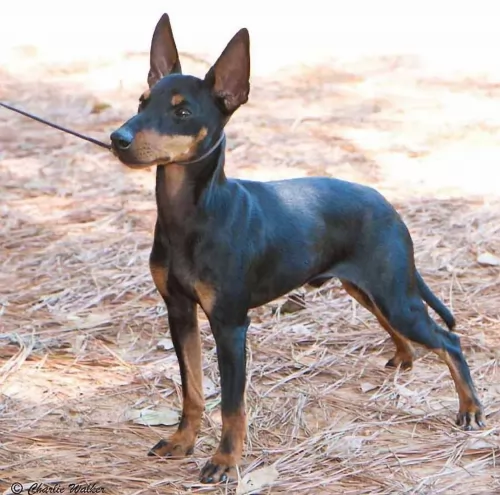 They English Toy Terrier (Black & Tan) is closely related to the Manchester Terrier and the Old English Black and Tan Terrier. The English Toy Terrier was developed to entertain humans in the rat pit due to its speed and agility. This is a sport that was very popular in English cities during Victorian times. Terriers went into the pits with a large number of rats and the winner would be the dog that killed a certain number of rats the fastest. The watchers would take bets on their favorite dog.
They English Toy Terrier (Black & Tan) is closely related to the Manchester Terrier and the Old English Black and Tan Terrier. The English Toy Terrier was developed to entertain humans in the rat pit due to its speed and agility. This is a sport that was very popular in English cities during Victorian times. Terriers went into the pits with a large number of rats and the winner would be the dog that killed a certain number of rats the fastest. The watchers would take bets on their favorite dog.
The English Toy Terrier was developed to be smaller than the Manchester Terrier, because smaller dogs were desired for the pit. In 1848 a small 2.5 kg black and tan terrier took less than an hour to kill 300 rats. When the Kennel Club was formed the sport of rat killing was outlawed. Because it was such a good looking dog, the black and tan was soon excelling in the show ring. To begin with there was one breed of Black and Tan Terriers and two weight classes. In 1920, the two were divided into separate breeds – the Manchester Terrier and the Black and Tan Terrier. It wasn’t until 1962 that the name changed to the English Toy Terrier (Black and Tan).In 1959, the declining numbers of Manchester Terriers caused the AKC to combine them again into one breed with two kinds: Toy and Standard.
Today the English Toy Terrier is one of the most vulnerable of the native breeds and efforts are in place to increase the gene pool and popularity of the dog. The UKC has also re-registered the English Toy Terrier (Black and Tan) in the stud book if it is a certified Toy. The breed is not AKC recognized.
 Known also as the Kuchi Dog, the Sage Koochee is a dog that was bred more for his characteristics than his looks. He was bred to be a protector and guardian and named after the Afghan Kochi people.
Known also as the Kuchi Dog, the Sage Koochee is a dog that was bred more for his characteristics than his looks. He was bred to be a protector and guardian and named after the Afghan Kochi people.
Referred to as the Kuchi or Sage Kuchi, this working dog has always helped nomads with guarding their caravans and livestock. The dog has genetic resemblance with the Central Asian Ovcharka but isn’t recognized as an official breed by any of the major kennel clubs.
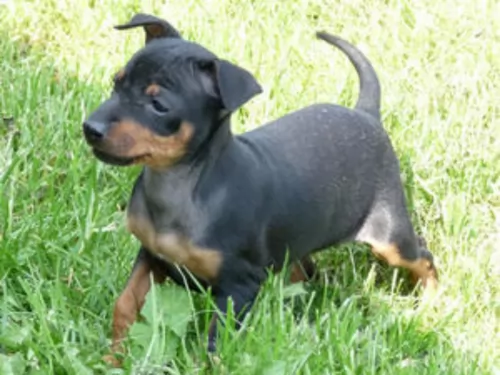 The English Toy Terrier is a small compact breed that resembles the Miniature Pinscher and the Manchester Terrier. The English Toy Terrier has a narrow but long head with a black nose, wedge muzzle and dark, almond shaped eyes. The ears are flame shaped and the chest is deep and narrow. He has thick legs and a tapered tail. The breed is of course black and tan – with the tan on the face, chest and legs.
The English Toy Terrier is a small compact breed that resembles the Miniature Pinscher and the Manchester Terrier. The English Toy Terrier has a narrow but long head with a black nose, wedge muzzle and dark, almond shaped eyes. The ears are flame shaped and the chest is deep and narrow. He has thick legs and a tapered tail. The breed is of course black and tan – with the tan on the face, chest and legs.
 The Sage Koochee is a large molosser dog, although they do vary quite a bit in height. This is because they generally come in 3 varieties.
The Sage Koochee is a large molosser dog, although they do vary quite a bit in height. This is because they generally come in 3 varieties.
They can stand at between 58 to 89cm in height and they weigh between 38 to 80kg. This is because this dog is divided into 3 types. The coat of this dog can be short, medium or long, and colors can vary quite a bit as well.
These are moderate, seasonal shedders. Their tails are usually docked to about 1/3 of their length and their ears have been traditionally docked too. They are very territorial and won’t show any tolerance to strangers coming onto the property. He also tends to be aggressive towards other dogs.
These dogs are tough and fierce and also immensely intelligent. Such a dog would have to be trained and socialized or you would land yourself with a strong-willed, disobedient dog.
Once they’ve had training, they are friendly, obedient and affectionate towards their owners, but aren't a good choice for children. They are extremely territorial and make good watchdogs,being prepared to fiercely protect their human family.
The very nature of this dog makes it not suitable for life in the city. It would be terribly frustrated in small spaces and can become aggressive.
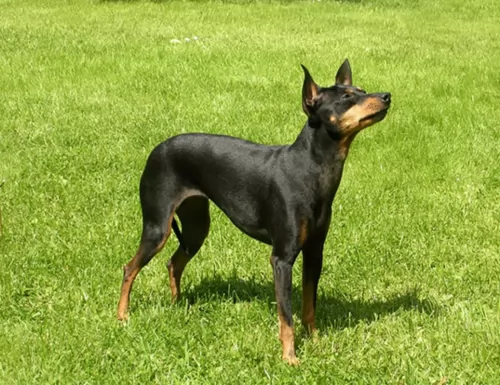 The English Toy Terrier is a stubborn, strong willed little dog. It has a fearless disposition and its alertness make it a great candidate for a guard dog despite its size. They will chase small animals due to their innate prey drive. They are affectionate and loyal and need to be with people. They love to be cuddled and petted, but usually choose one person that they become very close to. He is more than a lap dog. He can be playful, or he can be a small working dog.
The English Toy Terrier is a stubborn, strong willed little dog. It has a fearless disposition and its alertness make it a great candidate for a guard dog despite its size. They will chase small animals due to their innate prey drive. They are affectionate and loyal and need to be with people. They love to be cuddled and petted, but usually choose one person that they become very close to. He is more than a lap dog. He can be playful, or he can be a small working dog.
 The Kuchi has always been vigilant with guarding livestock, and these tough dogs did the job of guardian and protector extremely well.
The Kuchi has always been vigilant with guarding livestock, and these tough dogs did the job of guardian and protector extremely well.
They’re hardy too, used to coping with extreme weather conditions, from hot deserts to freezing mountain areas. These dogs are powerful and independent and they are also dangerous.
With good training and socialization they can become loving and loyal, but they require a strong, firm owner, and don’t come as recommended if there are children in the home.
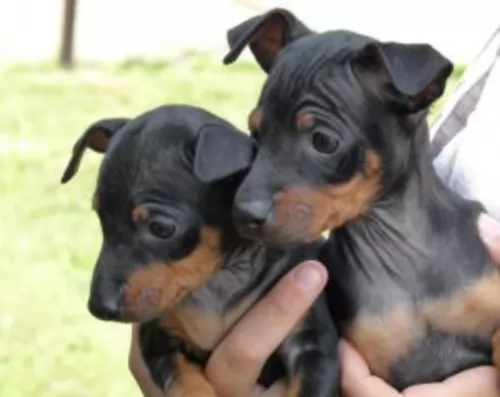 Like many Toy dogs, the English Toy Terrier is susceptible to:
Like many Toy dogs, the English Toy Terrier is susceptible to:
Dislocated kneecap – many small breeds are susceptible to this.
There has been a congenital line of deafness in the English Toy Terrier since it was developed with a cross from the English White Terrier. Unfortunately, some still breed these deaf dogs and continue to pass on the condition.
More painful than in the human eye, pressure builds up behind the eye ball. Dogs build up more pressure than humans and this can lead to blindness.
 The Kuchi breed is healthy and doesn’t have any particular health issues. Things to look out for are bloat, skin allergies, cancer and parasites.
The Kuchi breed is healthy and doesn’t have any particular health issues. Things to look out for are bloat, skin allergies, cancer and parasites.
Parasites are a common in many dogs. Fleas and ticks are external parasites, but intestinal parasites can be a real nuisance too and endanger your dog’s health.
These parasites live within the dog’s gastrointestinal tract. They can be a host of terrible worms such as roundworm, hookworms and tapeworm among others. The parasites are usually transmitted when the dog ingests contaminated food, soil or even feces.
These parasites can cause endless problems for the dog, from weight loss to diarrhea to vomiting. You will need to get your pet to the vet.
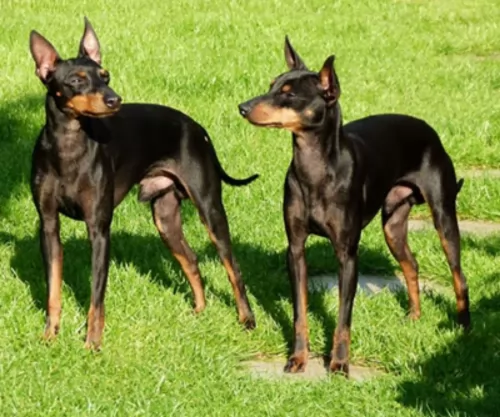 As a high energy small dog feed a high quality dry food that is designed specifically for small dogs. Feed about ¼ of a cup of food split into 2 meals.
As a high energy small dog feed a high quality dry food that is designed specifically for small dogs. Feed about ¼ of a cup of food split into 2 meals.
In addition to the health issues mentioned above:
This is an inherited blood disease in which a lack of protein has a negative effect of the platelets. This causes them not to form clots and so the dog has a bleeding issue.
Degeneration of the femur ball joint due to a blood deficiency issue. This can lead to arthritis.
Affects the lens by blocking the drainage from the eye creating a glaucoma like pressure.
The English Toy Terrier can develop skin issues so watch him closely.
The English Toy Terrier can be very energetic but that doesn’t actually mean she needs a ton of exercise. Because she is small she does not need as much as you might think. A half hour walk once a day is enough or just letting her run in your fenced yard.
He is an intelligent little dog who needs mental stimulation as much if not more than the solution. Play games like catch, hide and seek, frisbee, and performing tricks.
 A nutritious commercially manufactured dog food for large working dogs will be required for this strong, energetic dog. You want to provide it with some variety, so some homemade food added into the dry kibble twice a week will ensure he is healthy and content.
A nutritious commercially manufactured dog food for large working dogs will be required for this strong, energetic dog. You want to provide it with some variety, so some homemade food added into the dry kibble twice a week will ensure he is healthy and content.
Home-made food such as boiled chicken, brown rice or pasta and spinach, sweet potatoes and carrots all boiled slowly together will delight your pet. You just chop it up and add it to the dry kibble twice a week and your pet will never look back.
For his skin and coat, you can try to add in a little bit of raw meat occasionally.Dogs thrive on simple, consistent meals like this – nothing weird and spicy so as to avoid stomach upsets.
Groom your Kuchi dog by brushing him twice a week and check simultaneously for any lumps you may find on him.
Trim his nails.
Check his eyes and make sure they are clear with no signs of discharge.
Check inside the mouth for rotten or bad teeth as he can’t tell you if one is rotten and causing him tremendous pain and discomfort.
Make sure his vaccines are up to date to avoid life threatening canine diseases.
Provide him with a nice, warm dry place to sleep.
Make sure he has access to shade and sun when he’s outdoors.
Have him or her spayed or neutered to avoid puppies